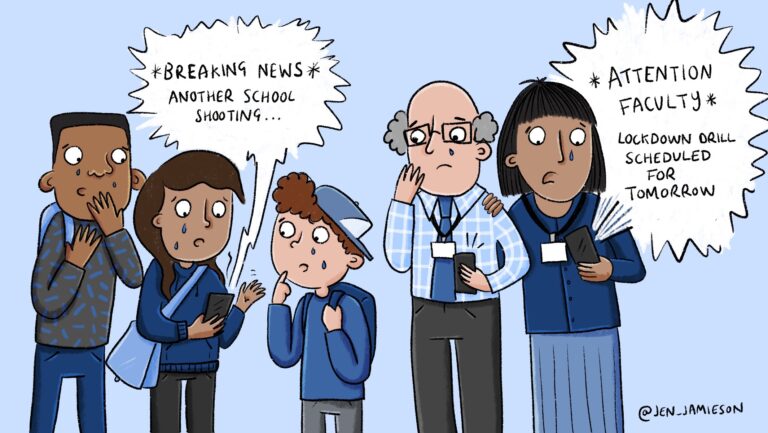Dear WeAreTeachers,
The theater teacher at our high school is a 25-year institution. Mrs. Fulman puts on an incredible musical every year, and our theater program is one of the top theater programs in the country. But so many students have shared stories with me of her toxic and abusive behavior. She screams at students who mess up in front of the cast and puts lead actresses on a diet called the Fulman Fifteen every year to lose weight for the performances … and these are some of the tamer stories. When I asked my students why they don’t report her, they all say the same thing: Either they have reported her and the administration “investigates” and comes up empty, or they haven’t because they’re certain she’ll retaliate and they want to stay in theater. How do I support my students? —I’m Not the Drama. (Am I the Drama?)
Dear I.N.T.D.,
Yikes. If it were just the stories about screaming, I might chalk it up to how loud theater teachers have to be for an auditorium full of kids to hear them. But the combined stories of toxic behavior are worrisome.
I would bet that this teacher is under a ton of stress, but it sounds like your school doesn’t have a problem with the way she handles that stress. Unfortunately, it’s not uncommon for schools to be more lenient toward teachers who bring in significant money/awards.
To me, even though this teacher’s behavior is worrisome, this issue is more appropriate for parents to take on than for a fellow teacher. As far as your role goes, I do think you have some responsibility here to:
- Make sure your students know that you are a safe person to report these kinds of things to, and that you’ll continue to support them no matter what.
- Help facilitate action while allowing students to retain ownership of the movement to advocate for themselves. When they complain about the theater teacher, say, “I’m sorry you feel stuck. Have you considered asking other students to report their experiences and presenting them as an organized front?”
- Email your principal about the diet thing so it’s in writing. That one concerns me the most, both for the students and for you as a mandatory reporter.
Part of our jobs as teachers is to protect students from abusive behavior, but I think it’s equally important to empower students to protect themselves. Having a strong example from you as a facilitator can stay with these students far beyond high school.
Dear WeAreTeachers,
It’s “letter of recommendation” time at my school, and this week I got a request from a student I don’t think I can recommend in good faith. I’ve had to hound this student all year to turn in work, only to be met by him arguing why his grade should have been higher. I don’t think I can recommend him, especially to the honors program he’s applying for. Should I send an honest (negative) recommendation or just tell him I won’t write one? —Happy to Write You a Letter of Hesitation
Dear H.T.W.Y.A.L.O.H.,
Rather than telling, I think this situation should be about guiding the student to understand why you can’t write one. This is a valuable learning opportunity for him, and simply sending off a bad recommendation won’t teach the same lesson (or anything).
First, talk to the student privately and ask for input. “When I write letters of recommendation, I make sure to include specific examples that highlight a student’s work ethic, positive attitude, responsibility, or other traits that would make them a strong candidate for admission into that program. What examples from our time together would you include?” Have an open mind here—he might have some insight or perspective you didn’t expect.
If they struggle to think of anything, you can say, “You know, we’re not always going to be at our best in every class. And that’s OK. But I want you to have the best shot at getting into this program, so I would recommend asking someone who will be able to write you a stellar letter that speaks to your strengths.”
He’ll see between the lines here—that in his next academic or work environment, the time to be thinking about a letter of recommendation is while you’re working for that person, not right before you leave.
Dear WeAreTeachers,
My principal invited me to come chat in his office one day about a new position opening up as a dean of students. He said this job had my name on it, encouraged me to apply, and even said he had to leave the posting up for a certain number of days as a formality before being able to give it to me. Well, my interview came and went, and then three weeks of radio silence before my principal told me they went with another candidate “but it was so close.” I feel disappointed, obviously, but also misled to believe the position was mine. Should I be honest about how I’m feeling? —Left at the Alter (Professionally Speaking)
Dear L.A.T.A.,
Oh, this is a tough situation to be in.
You have every right to feel disappointed and frustrated—those are valid feelings. I still don’t think it’s wise to share them with your principal. Here’s why.
A few years ago, I spent a summer shadowing an administrative leader in our district. I got to sit in on interviews for all kinds of positions in the district, from campus counselors to assistant superintendents. It was eye-opening to see the abundance of skills, experience, and stellar personalities applying for the same position. Suddenly, I thought back to times I hadn’t gotten a job and had been told, “We had such a hard time deciding between several qualified candidates—it was so close!” I never believed it at the time, but after seeing it for myself as an observer, it was clear that sometimes the difference really was one heartfelt recommendation letter, one extra year of experience, or one technology certification.
Here’s what I bet happened: Your principal really did want to hire you, and it was really close. But maybe your principal never considered that they’d find a better-qualified candidate and spoke too candidly too soon. Your principal has likely learned a tough lesson here—never give out false hope—and unfortunately you were on the receiving end.
I think it’s totally fine to say something like, “Thanks so much for considering me. I was really hoping to be selected, but I understand that the competition was tough. Please let me know if you hear of similar vacancies opening up at our school or elsewhere—I would love the opportunity to serve as dean.” That shares your disappointment, acknowledges what was likely a painful decision for your principal, and hopefully sets you up for a shiny letter of rec when the next school over needs a dean.
Do you have a burning question? Email us at askweareteachers@weareteachers.com.
Dear WeAreTeachers,
I teach and coach at the same high school I attended as a student, so I know many of my students’ parents. Earlier this week, I told one of my soccer players he wouldn’t be playing since he missed both practices that week. That night, I answered our door to find his dad, who immediately launched into an angry tirade about his son not playing, complaining that “we’ve known each other for years.” I was so in shock I barely knew what to say other than that I wasn’t budging on my position. I’m not surprised that he knew where I live given how small our community is, but I’m angry that he felt entitled to show up at my home simply because he didn’t get his way. Do I handle this directly with the parent? —Get Off My Lawn


